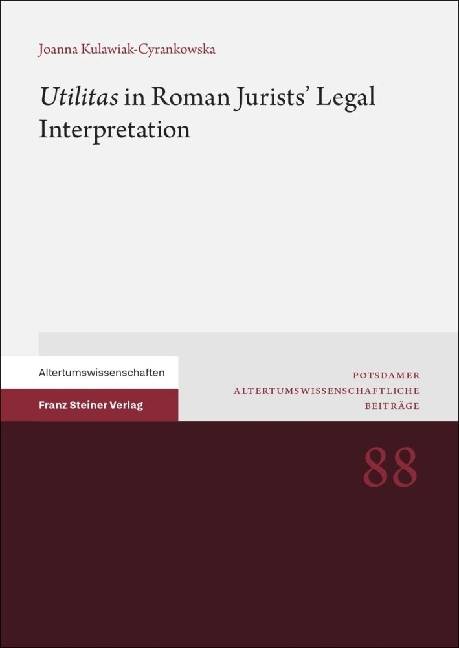
Bedankt voor het vertrouwen het afgelopen jaar! Om jou te bedanken bieden we GRATIS verzending (in België) aan op alles gedurende de hele maand januari.
- Afhalen na 1 uur in een winkel met voorraad
- In januari gratis thuislevering in België
- Ruim aanbod met 7 miljoen producten
Bedankt voor het vertrouwen het afgelopen jaar! Om jou te bedanken bieden we GRATIS verzending (in België) aan op alles gedurende de hele maand januari.
- Afhalen na 1 uur in een winkel met voorraad
- In januari gratis thuislevering in België
- Ruim aanbod met 7 miljoen producten
Zoeken
'Utilitas' in Roman Jurists' Legal Interpretation
Joanna Kulawiak-Cyrankowska
€ 132,45
+ 264 punten
Uitvoering
Omschrijving
This study offers a comprehensive analysis of utilitas, a central concept in Roman law, and its pivotal role in shaping legal interpretation. Moving beyond its traditional view as a merely pragmatic tool, utilitas is shown to guide legal outcomes that not only address practical needs but also align with broader ethical values of righteousness and justice. It argues that a complete understanding of utilitas in legal reasoning - both in meaning and function - can only be achieved by synthesizing jurisprudential, philosophical, and rhetorical perspectives. Through this interdisciplinary lens the book demonstrates that decisions made utilitatis causa, exceptional in their departure from established legal rules, can only be fully understood through the lens of rhetorical theory of legal interpretation, offering a framework that transcends the limitations of literal interpretation. Contributing to ongoing scholarly discourse in Roman law, legal theory, and philosophy, this study provides fresh insights into a concept that remains central to contemporary discussions of legal interpretation and justice.
Specificaties
Betrokkenen
- Auteur(s):
- Vertaler(s):
- Uitgeverij:
Inhoud
- Aantal bladzijden:
- 262
- Taal:
- Engels
- Reeks:
- Reeksnummer:
- nr. 88
Eigenschappen
- Productcode (EAN):
- 9783515136686
- Verschijningsdatum:
- 1/04/2025
- Uitvoering:
- Paperback
- Formaat:
- Trade paperback (VS)
- Afmetingen:
- 170 mm x 240 mm
- Gewicht:
- 453 g

Alleen bij Standaard Boekhandel
+ 264 punten op je klantenkaart van Standaard Boekhandel
Beoordelingen
We publiceren alleen reviews die voldoen aan de voorwaarden voor reviews. Bekijk onze voorwaarden voor reviews.









